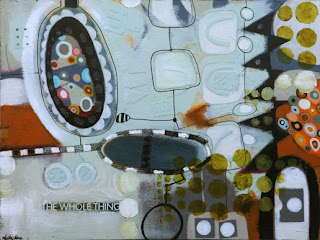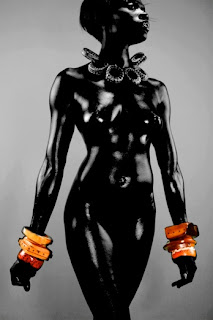 |
| Artist Maurice Evans in his studio |
The Renaissance Man—a fitting name for a man whose
creativity is not limited to just one medium. His love
for creative diversity, and his patience to master them all sets Maurice Evans
apart from many of the artists I have had the pleasure of meeting. His studio induces inspiration whether or not
you create. As I sat to talk to him, Evans (never one to be idle) sketched out
his ideas and thoughts in a notebook on the table. He lives by the premise, “Create
art for arts sake,” and that allows him to be the spontaneous
and comprehensive artist that he is.
 |
| Maurice Evans at work in his studio |
 |
| Maurice Evans at work in his studio |
Maurice Evans was born in Smyrna, TN to a father who was a
military man, and a mother who was a teacher. Because his father was in the
military, they moved around quite a bit, eventually settling in Georgia. At a
young age, Evans was aware of his love for the arts, in particular the drawings
in comic books. He began collecting them regularly, and found himself
frustrated when they began covering the books with plastic. For him, that took
away the joy of seeing the images inside before purchasing the them.
 |
| © Maurice Evans |
He thoroughly enjoyed art, but his first true love was
music. Evans' father was a drummer, and a singer in a gospel choir, and at an
early age he introduced him to great musicians like Al Green, Chaka Khan, and
Marvin Gay. The music touched the young, shy Evans, and he wanted to
learn more about how to make it himself. He helped his father breakdown his
instruments, and when he was four, he began taking guitar lessons from one of
his father’s military companions. Evans remembers the lessons being a very
important part of his creative growth, and he was devastated when they ended. Evans says that he began to draw more because it was more
accessible to him than creating the music he so loved. He attempted to join to
band, while in school, in order to fill the musical void that he felt was
missing, but he didn’t make it. That, in addition to his parents divorce, caused
a devastating shift in his life, and art took precedence over music.
 |
| One Mo-Than-Three Trumpet © Maurice Evans |
Maurice Evans attended Griffin High School in Griffin, GA. In
high school, he was a talented art student, and it was there that he first
began gaining recognition for his talent. His mother was a teacher, and she
supported his creativity by allowing him to design her classroom boards each
year. Toward the end of his high school years Evans made a decision not to go
to the military like his father, and he also decided that he didn’t want to
attend a four-year college. He decided to apply to art school, and in 1986 he
was accepted to the Art Institute of Atlanta where he studied Fashion
Illustration. Evans says that he chose that major because he wanted to do
actual painting and drawing, as opposed to spending a lot of time on the
computer.
 |
| Songstress © Maurice Evans |
 |
| Crooner © Maurice Evans |
After college,
he worked odd jobs, even delving back into music for a time. It was always
apart of his life, but he wanted to see if he could become a producer full
time. Although, that option didn’t work for Evans, his love for music stayed with him. Eventually,
he took a position as a medical illustrator and worked the position for about a
year until he was laid off.
Evans says that even early in life he recognized that people
came into his life to help, “put him on his path.” There were moments in his
life where he stopped creating, and a classmate or someone that he would meet
along his journey would encourage him to continue. Many of the people who
encouraged him are no longer artists, so he feels that he got better, not
because he was the best, but simply because he continued.
 |
| © Maurice Evans |
 |
| © Maurice Evans |
Evans was working odd jobs again, when one day his college
friend, Grace Kisa, told him about an open position at her job. She worked with
a company called, Graphic Du Jour, creating unique paintings on demand. He
landed the job and worked with the company for three years. He says of his time
there, “ It opened me up to a new way of looking at art—a way to create art
like a brand.” His relationship with Graphic Du Jour dissolved after three
years and he ended up taking a job with a smaller company doing the same thing.
That relationship also dissipated because he didn’t like being, “controlled,”
or feeling like a “machine.” That quest for freedom prompted Evans to pursue
his own creative goals and in 1994 he applied and got into the juried Black
Arts Festival in Atlanta. With the help of his mother and friends, Evans had a
successful exhibition, and was able to make enough money to buy a booth at the
New York Art Expo. It was there that he met new clients and collectors and from
there his work began to take off. Soon, he was exhibiting his work in
galleries, and people were paying attention to his pieces nationally and
internationally.
 |
| © Maurice Evans |
Evans says that he had found his creative style right before
the Black Arts Festival. His stylized images with their elongated necks and
arms expressed movement and color in a unique way. He had always painted still
life, landscapes, and abstract art, but he had developed a new style that
people latched on to. His love for music drove him to create a series called,
“The Colour of Jazz.” Collectors began to gravitate towards that work, so he focused
on creating more of those pieces. His love for music made him pay attention to details
that many artists would overlook, like the musician’s hands and the movements they made as they played
their instruments.
 |
| © Maurice Evans |
His paintings captured the essence of a music that crossed
color barriers, and he used his mesmerizing palette to highlight the feeling
and mood that the music evoked. His color palette—organic and African in its
roots—is a very recognizable and respected part of his work. Evans says of his
color choices, “Its natural for me to do colorful stuff, it’s a conscious
effort to do something not so colorful.”
 |
| © Maurice Evans |
While experimenting and creating what he calls, “Art for
arts sake,” Evans came upon of new way to express his ideas. He wanted to experiment
with different ways of travelling so he created a series entitled, “Flying
without Wings.” This series focused on the idea that there is more than one way
to reach your destination in life—more than one way to travel.
 |
| © Maurice Evans |
 |
| © Maurice Evans |
Many artists and creative colleagues found the work
intriguing, but some of his client base were confounded—they felt uncomfortable
with the nudity and imagery, and had grown used to his previous musical
pieces—an issue that Evans encountered a lot with the conservative black
collectors. But Evans felt trapped by his previous art, and he really wanted to
move past that work and evolve, so he continued to create the work that moved him
most. For Evans, his transition and growth was less about monetary gain, but
more about challenging himself to do something new and different. “You have to
find the courage to go down a path that others tell you not to go down.”
 |
| © Maurice Evans |
Another of Evans fascinating skills lies in his gift for
photography. Evans began taking pictures while in college because he wanted to shoot
his own references for his paintings. It was during that time that he happened
upon a model that helped him develop his own style of photography. Her open
personality and willingness to shoot anywhere gave Evans the leeway to explore
his imagination. She would soon become his photographic muse as he created
unique art through his lens.
 |
| © Maurice Evans |
Evans felt that what he was doing was unique, but the gift of a book called, "Soul," from Grace Kisa showed Evans that someone else was already shooting in a similar way. He was inspired to take his images to the next level by integrating his
art with his photography. He created mixed media works using his photography,
and garnered a lot of positive attention for the work. His current series with
Grace Kisa fuses her styling and design techniques with his photography and
art. This new series, which is Afro Futuristic in nature, explores the black
nude female image in a classically modern way.
 |
| © Maurice Evans |
A filmmaker as well, Evans has also worked on movies,
documentaries and music videos. Evans is a prolific and comprehensive artist,
mastering all of the mediums that he attempts with an adept hand. A Renaissance
Man in his own right, Evans continues to create a vast legacy for himself in
the creative world.
 |
| © Maurice Evans |
He leaves some insight:
On finding your own voice:
“Be careful when you like other artists. We all like other
artists…the tricky part is learning from them and letting it inspire you. It’s
important to tap into who you are as
an artist then no one else can do what you do.”
“Finding a style is like finding your signature…we all learn
how to write a’s and b’s, but your signature is your own. It takes time to
develop…it takes work and effort to get it."
On buying art:
“[Many artists] have paid the price to get where they are,
and that’s why the work costs so much because you are paying for a piece of that
artist, and that is one of a kind."
“People should think about how art makes them feel, and buy
based on that.”
On being an artist:
“Art can impact the lives of people on a visceral level.
Sometimes the work may not affect you as much as it does the viewer.”
“It’s important to create for you, if people get it they do,
if not, oh well.
“
The only thing we have in life is art and love.”
-Maurice Evans
To learn more about this artist, please visit his website at www.mauriceevans.com.
All images are © copyrighted by the artist unless otherwise noted. Images cannot be reproduced without permission of the artist.
Cultured Artists™ ©2013














0 comments:
Post a Comment